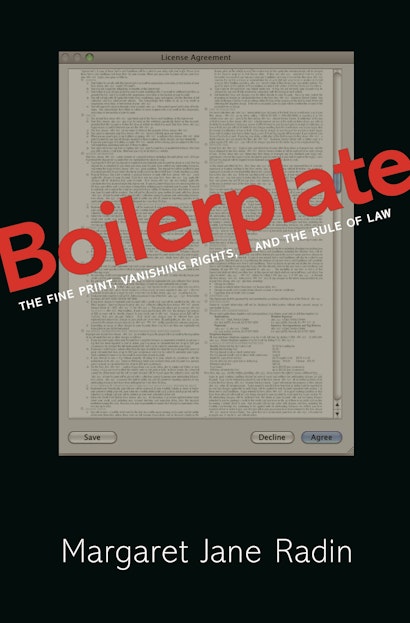Boilerplate—the fine-print terms and conditions that we become subject to when we click “I agree” online, rent an apartment, enter an employment contract, sign up for a cellphone carrier, or buy travel tickets—pervades all aspects of our modern lives. On a daily basis, most of us accept boilerplate provisions without realizing that should a dispute arise about a purchased good or service, the nonnegotiable boilerplate terms can deprive us of our right to jury trial and relieve providers of responsibility for harm. Boilerplate is the first comprehensive treatment of the problems posed by the increasing use of these terms, demonstrating how their use has degraded traditional notions of consent, agreement, and contract, and sacrificed core rights whose loss threatens the democratic order.
Margaret Jane Radin examines attempts to justify the use of boilerplate provisions by claiming either that recipients freely consent to them or that economic efficiency demands them, and she finds these justifications wanting. She argues, moreover, that our courts, legislatures, and regulatory agencies have fallen short in their evaluation and oversight of the use of boilerplate clauses. To improve legal evaluation of boilerplate, Radin offers a new analytical framework, one that takes into account the nature of the rights affected, the quality of the recipient’s consent, and the extent of the use of these terms. Radin goes on to offer possibilities for new methods of boilerplate evaluation and control, among them the bold suggestion that tort law rather than contract law provides a preferable analysis for some boilerplate schemes. She concludes by discussing positive steps that NGOs, legislators, regulators, courts, and scholars could take to bring about better practices.
Awards and Recognition
- Winner of the 2014 Scribes Book Award, The American Society of Legal Writers
"[Radin] has given us a sophisticated and thought-provoking treatment of the boilerplate contracts that everyone signs yet few read or understand."—Robert F. Nagel, Wall Street Journal
"Radin makes a compelling case that boilerplate constitutes a clear and present danger to our core values. The practical remedies she suggests ought to command the attention of anyone concerned about the imposition of non-negotiable terms on American consumers."—Glenn C. Altschuler, Huffington Post
"Boilerplate is exemplary scholarship: lucid, jargon-free, and focused on solving problems as well as identifying them. It's a model of the 'process,' inside-the-system track for social change."—Michael Stern, American Lawyer
"Boilerplate is a book from which all readers could benefit, whether or not they ultimately agree with every one of the author's analyses and conclusions."—Brian
H. Bix, Tulsa Law Review
"One of the things I like so much about Boilerplate is that it clarifies just how deep and pervasive this problem is for modern contract theory as a whole. By casting doubt on one of the most common starting points in modern contract theory, Radin in effect forces us to reflect on the basic object of the inquiry. She thereby challenges us to produce either better theories or a better world, and to do so based on the facts rather than fanciful pictures of the market."—Robin Bradley Kar Jot, Illinois Public Law and Legal Theory Research Papers Series
"The law has allowed a very basic idea—that humans might come to an agreement—to morph into an embarrassment for law and injustice for too many. This brilliant and powerful book puts the mess in context, and offers a path forward to reform."—Lawrence Lessig, Harvard University
"This important book lays out the strongest possible attack on a legal regime that allows businesses to predraft terms of agreement, modify consumers' legal rights, and privately legislate rules of play in the market. To those interested in understanding the values that such practices violate, the potential harms that widespread boilerplate may cause, and legal methods that can be harnessed to protect vanishing consumer rights, this book is a milestone."—Omri Ben-Shahar, University of Chicago
"This clear and highly readable book makes accessible to a wide audience the most comprehensive and in-depth discussion to date of a persisting challenge to the legitimacy of contract relations in modern societies. We all have to deal with boilerplate. Radin's outstanding book is indispensable to understanding its practical and theoretical significance, and to promoting justice in contractual relations."—Peter Benson, University of Toronto Faculty of Law
"When we sign or click on a form we never negotiated or even read, do we really 'agree' to all the terms its drafter wishes to impose on us—no matter how sneaky or outrageous? Radin shows how allowing boilerplate to govern our relationships can degrade our values and democracy. This elegant and lucid book is a profound meditation on contract law and the meaning of consent."—Robert W. Gordon, Stanford Law School
"This beautifully written and persuasively argued book tackles an immensely important and timely topic: the increasing use of boilerplate or standard form contracts in the provision of goods and services. It will receive much attention for its diagnosis of problems that boilerplate contracts present and for its imaginative canvassing of possible legal and regulatory responses."—Michael Trebilcock, University of Toronto Faculty of Law
"Radin critiques the mass phenomenon of boilerplate, or nonnegotiable contract terms, of which consumers are unlikely to be aware. The book introduces and elegantly combines several theoretical challenges in this area and will be an important intervention in the debate."—Aditi Bagchi, Fordham University School of Law

